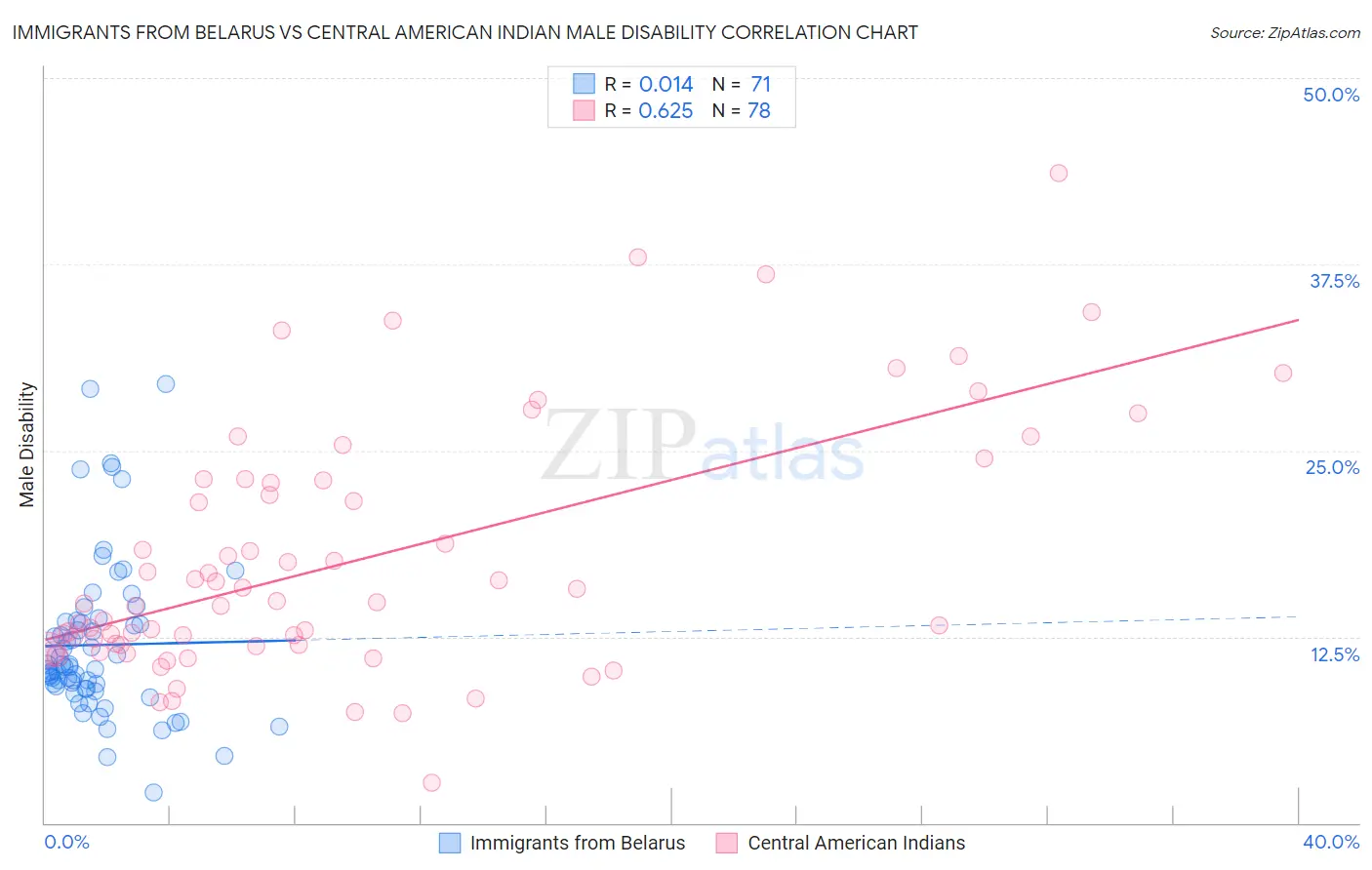Immigrants from Belarus vs Central American Indian Male Disability
COMPARE
Immigrants from Belarus
Central American Indian
Male Disability
Male Disability Comparison
Immigrants from Belarus
Central American Indians
10.4%
MALE DISABILITY
99.3/ 100
METRIC RATING
63rd/ 347
METRIC RANK
12.7%
MALE DISABILITY
0.0/ 100
METRIC RATING
278th/ 347
METRIC RANK
Immigrants from Belarus vs Central American Indian Male Disability Correlation Chart
The statistical analysis conducted on geographies consisting of 150,193,333 people shows no correlation between the proportion of Immigrants from Belarus and percentage of males with a disability in the United States with a correlation coefficient (R) of 0.014 and weighted average of 10.4%. Similarly, the statistical analysis conducted on geographies consisting of 326,112,546 people shows a significant positive correlation between the proportion of Central American Indians and percentage of males with a disability in the United States with a correlation coefficient (R) of 0.625 and weighted average of 12.7%, a difference of 21.3%.

Male Disability Correlation Summary
| Measurement | Immigrants from Belarus | Central American Indian |
| Minimum | 2.0% | 2.7% |
| Maximum | 29.5% | 43.7% |
| Range | 27.4% | 40.9% |
| Mean | 11.9% | 17.7% |
| Median | 10.5% | 14.8% |
| Interquartile 25% (IQ1) | 9.0% | 11.9% |
| Interquartile 75% (IQ3) | 13.5% | 23.0% |
| Interquartile Range (IQR) | 4.4% | 11.0% |
| Standard Deviation (Sample) | 5.3% | 8.4% |
| Standard Deviation (Population) | 5.2% | 8.3% |
Similar Demographics by Male Disability
Demographics Similar to Immigrants from Belarus by Male Disability
In terms of male disability, the demographic groups most similar to Immigrants from Belarus are Immigrants from Ecuador (10.4%, a difference of 0.020%), Jordanian (10.5%, a difference of 0.12%), Immigrants from Grenada (10.5%, a difference of 0.15%), Guyanese (10.5%, a difference of 0.15%), and Immigrants from Afghanistan (10.5%, a difference of 0.16%).
| Demographics | Rating | Rank | Male Disability |
| Tongans | 99.6 /100 | #56 | Exceptional 10.4% |
| Immigrants | South America | 99.6 /100 | #57 | Exceptional 10.4% |
| Immigrants | Japan | 99.5 /100 | #58 | Exceptional 10.4% |
| Immigrants | Australia | 99.5 /100 | #59 | Exceptional 10.4% |
| Immigrants | Colombia | 99.5 /100 | #60 | Exceptional 10.4% |
| Immigrants | Northern Africa | 99.4 /100 | #61 | Exceptional 10.4% |
| Immigrants | Ecuador | 99.3 /100 | #62 | Exceptional 10.4% |
| Immigrants | Belarus | 99.3 /100 | #63 | Exceptional 10.4% |
| Jordanians | 99.3 /100 | #64 | Exceptional 10.5% |
| Immigrants | Grenada | 99.2 /100 | #65 | Exceptional 10.5% |
| Guyanese | 99.2 /100 | #66 | Exceptional 10.5% |
| Immigrants | Afghanistan | 99.2 /100 | #67 | Exceptional 10.5% |
| Colombians | 99.2 /100 | #68 | Exceptional 10.5% |
| Ecuadorians | 99.2 /100 | #69 | Exceptional 10.5% |
| Immigrants | Bulgaria | 99.1 /100 | #70 | Exceptional 10.5% |
Demographics Similar to Central American Indians by Male Disability
In terms of male disability, the demographic groups most similar to Central American Indians are Slovak (12.7%, a difference of 0.15%), Dutch (12.7%, a difference of 0.20%), Sioux (12.7%, a difference of 0.26%), Irish (12.7%, a difference of 0.31%), and German (12.7%, a difference of 0.32%).
| Demographics | Rating | Rank | Male Disability |
| Scandinavians | 0.1 /100 | #271 | Tragic 12.3% |
| Hmong | 0.0 /100 | #272 | Tragic 12.5% |
| Native Hawaiians | 0.0 /100 | #273 | Tragic 12.5% |
| Hopi | 0.0 /100 | #274 | Tragic 12.5% |
| Fijians | 0.0 /100 | #275 | Tragic 12.6% |
| Africans | 0.0 /100 | #276 | Tragic 12.6% |
| Finns | 0.0 /100 | #277 | Tragic 12.6% |
| Central American Indians | 0.0 /100 | #278 | Tragic 12.7% |
| Slovaks | 0.0 /100 | #279 | Tragic 12.7% |
| Dutch | 0.0 /100 | #280 | Tragic 12.7% |
| Sioux | 0.0 /100 | #281 | Tragic 12.7% |
| Irish | 0.0 /100 | #282 | Tragic 12.7% |
| Germans | 0.0 /100 | #283 | Tragic 12.7% |
| Spanish | 0.0 /100 | #284 | Tragic 12.7% |
| Welsh | 0.0 /100 | #285 | Tragic 12.7% |